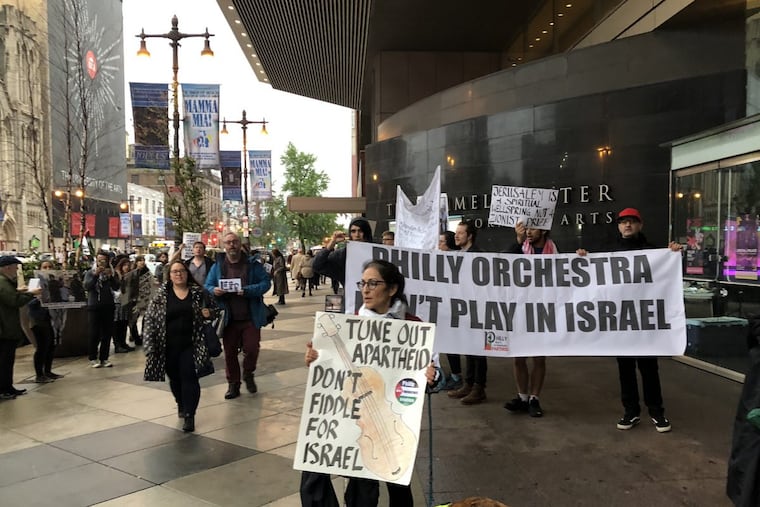Philadelphia Orchestra is out of touch - and not just related to Israel trip | Opinion
A right-wing fantasy tour of Israel; a glaring absence of women's voices; an artistic vacuum when it comes to contemporary music; all hiding behind a romantic notion of the sanctity of classical music.

On Saturday, my wife and went to see the exciting new play Mrs. Harrison, being staged by the Azuka Theater company at the Drake. Traffic was snarled even more than usual, and as we neared Broad and Spruce, we saw why: Activists were in the street outside the Kimmel Center, protesting the Philadelphia Orchestra's upcoming tour to Israel. During that evening's performance of Tosca, protesters briefly disrupted the concert. Conductor Yannick Nézet-Séguin slammed down his baton, and apparently plugged his ears briefly to block out the disruption. Later, the orchestra's leadership called for dissenters to respect "the sanctity of the concert hall."
It's an interesting phrase, "the sanctity of the concert hall." What is so sacred about an entertainment venue like Verizon Hall? Historically speaking, it's a comparatively recent innovation to think of listening to secular music as if one were in church. Let alone a performance of Tosca, Puccini's famous "shabby little shocker" whose premiere in 1900 was also riven by political tension, with bomb threats amid the presence of the Italian queen and prime minister in the audience. The notion of sitting quietly and listening reverently would have been absolutely foreign to Puccini, and indeed to listeners of most music throughout history.
>> READ MORE: Philadelphia Orchestra's Israel tour enables musicians and supporters to engage with complex reality of Israel | Opinion
Breaking the sanctity of the concert hall has also been the precise mission of the most exciting classical music institution in town these days, Opera Philadelphia. At its festival last fall, the organization staged operas that moved nimbly in and out of the traditional concert hall. At the Barnes, audience and performers strolled together in the forecourt making uncomfortable eye contact. At the Wilma, the premiere of We Shall Not Be Moved staged the trauma of the MOVE bombing, with the creators workshopping material with local high school students, and audience members invited to share their memories of the event. Monteverdi and a recent opera examining military PTSD were paired together at the Art Museum. At all of these and others — The Magic Flute at the Academy of Music, a premier of a new Kevin Puts work at the Perelman — rather than hushed reverence I sensed a vibrant, urgent energy. There's nothing wrong with sanctity, but we ought not confuse it with the muffled, quiet sound of a dwindling congregation.
Meanwhile, the orchestra stands resolutely athwart history yelling "stop." Take next year's season. Just as the larger classical music establishment had finally started to reckon with longstanding issues of gender equality and sexual harassment, the orchestra made the astounding decision to not program a single musical work by a woman. Programming of new music has slowly gotten better under Nézet-Séguin's leadership, but looking ahead, it's hard to imagine the orchestra being at the center of any larger national conversation in the way Opera Philly has been.
And into this morass came the orchestra decision to tour Israel. There's a conversation to be had about the role of cultural boycotts in the Israel-Palestine situation. To be clear, the orchestra has made decisions which place them beyond the usual norm of liberalism. When touring Israel, other cultural institutions have attempted to tread the line of reconciliation. One thinks immediately of projects such as the West-Eastern Divan Orchestra, or of Philadelphia's own Peace Drums initiative.
>> READ MORE: By touring Israel, Philadelphia Orchestra ignores crimes against Palestinians | Opinion
Whatever the efficacy of those strategies, the orchestra took a very different approach, initially planning an itinerary for a patrons' tour that included meetings with right-wing politicians, military leaders, and corporate tycoons. In partnership with the Jewish Federation of Greater Philadelphia, donors accompanying the tour could even make a special VIP visit to an Israeli Defense Force base, where one doubts their recent killing of 62 protesters in Gaza will come up. In response to the protests, the orchestra now claims it "intends to spend as much time as possible interacting with Arab communities to deepen our understanding of life in the region, and how we can continue to engage in conflict resolution through music." The orchestra will pardon us if this is a little bit hard to imagine.
A right-wing fantasy tour of Israel, a glaring absence of women's voices, an artistic vacuum when it comes to contemporary music – all hiding behind a romantic notion of the sanctity of classical music. These problems are all connected, and speak to the orchestra's anxiety at its own status in this city, and in the larger world. For generations the Philadelphia Orchestra was one of few institutions in this town that could claim a world-class status, and even for the many citizens who could care less about classical music, this was a source of pride. Today, it's hard to find similar pride in an organization so attached to a nostalgic, often reactionary vision of its own history. There is room for lots of different kinds of music in our big city, and maybe it is for the best if the Philadelphia Orchestra is no longer at its center.
Philip Gentry is a musicologist at the University of Delaware, and author of the recent book "What Will I Be: American Music and Cold War Identity" (Oxford, 2017). pgentry@udel.edu